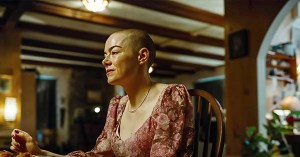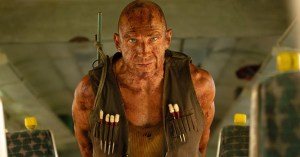Total Recall: Movies Based on Toys and Games
With G.I. Joe: Retaliation hitting theaters, we look at some memorable movies based on children's playthings.
Ready or not, a Real American Hero is invading the box office this weekend, and to help herald G.I. Joe: Retaliation‘s arrival in theaters, we decided to dedicate this week’s list to other toys and/or games that made the jump from store shelves to the big screen. It would be wise not to expect any Best Picture winners in here, obviously, but you might be surprised by the amount of good old-fashioned nostalgic fun that can come from reliving memories of movies from an often rather cynically motivated genre. (Word to the wise: This is also one of the most 1980s-centric lists we’ve done in quite some time.) Get ready to beg your parents for more action figures and stuffed animals — it’s time for Total Recall!
Battleship
34%Insofar as any movie that was inspired by a game entering its eighth decade of existence can be called a “sure thing,” 2012’s Battleship really seemed to fit the description — directed by action vet Peter Berg and rounded out with a cast that was loaded with what the studio execs like to call “multi-platform synergy,” it launched with a $209 million budget and a prime May release date. Sadly, Battleship was met with some choppy critical waters as it embarked upon its box office voyage — and although it eventually earned more than $300 million worldwide, it ended up going down as one of the year’s costlier flops. “This,” groaned Slate’s Dana Stevens, “is the kind of summer movie that softens your brain tissue without even providing the endocrine burst of pleasure that would make it all worthwhile.”
Bratz: The Movie
10%Perhaps chiefly notable for being the movie that jettisoned executive producer/choreographer/wardrobe designer Paula Abdul before a single frame of film was shot, Bratz: The Movie brought its titular line of dolls/cartoon characters to big-screen life via a storyline involving high school cliques, rapper/Tom Hanks offspring Chet Haze, Jon Voight, and a prosthetic nose. Given all that, its $26 million box office gross has to seem like something of a triumph, but critics proved stubbornly unmoved by the Bratz gals’ charms; as Ruthe Stein observed for the San Francisco Chronicle, “The proud owners of Bratz dolls almost surely have had more imaginative fantasies about them than anything onscreen.”
The Care Bears Movie
28%In his biggest film role since playing a grumpy retired jockey in 1979’s The Black Stallion, Hollywood legend Mickey Rooney lent his voice to the crucial dual role of “Mr. Nicholas Cherrywood” and “Narrator” in The Care Bears Movie, a 75-minute animated feature that doubled as a thinly disguised commercial for the cuddly stuffed feelings ambassadors created by the American Greetings Corporation. Clearly, the toys made an impact — the Care Bears franchise endures today — and the movie proved a solid hit at the box office, saving the Nelvana studio from bankruptcy on its way to spawning a pair of sequels. For critics, it proved more of a mixed bag, but Richard Grenier of the New York Times appreciated its gentle message, writing that “This endearing movie’s mottoes are: never stop caring. And: the best way to make friends is to be a friend yourself.”
Clue
73%Base a movie on a board game, and you’re really setting yourself up for a pretty tough time at the box office — just ask Peter Berg. But of all the board-game-to-film adaptations that have tanked during their initial theatrical runs (um, all two of them), the 1985 ensemble murder mystery farce Clue has fared most respectably by far, steadily building a cult audience after limping into the home video market with a piddling $14.6 million gross. Its 62 percent Tomatometer doesn’t accurately reflect the bewilderment felt by filmgoers who felt cheated by its “three different endings” gimmick, which required the truly hardcore fan to visit multiple theaters in order to see them all, but it’s reflective of the affection currently felt by critics like Gregory Weinkauf of New Times, who said it “deserves its own little niche in camp cinema history.”
Dungeons & Dragons
9%If there had to be a movie based on the ever-popular Dungeons & Dragons roleplaying game, the smart money would have been on it making its way to the screen during D&D‘s first flush with mainstream success in the early 1980s — back when, for instance, the game had its own TV series. But the smart money, along with every other kind of money, lost against 2000’s Dungeons & Dragons, a long-overdue live-action adaptation that found Jeremy Irons, Thora Birch, and Marlon Wayans trying in vain to replicate some semblance of the home version’s magic. Scoffed Susan Stark of the Detroit News, “This movie may be the clumsiest, most inept cinematic exploitation of an item with kid appeal that we have yet seen.”
G.I. Joe: The Rise of Cobra
33%It wasn’t supposed to be this way for G.I. Joe. His true debut, 1987’s G.I. Joe: The Movie, saw its cinematic destiny thwarted when a pair of other Hasbro-sanctioned animated toy adaptations — Transformers: The Movie and My Little Pony: The Movie — were met with failure so ignominious that direct-to-video seemed like the only sensible option. More than two decades later (and with a live-action cast that included Channing Tatum and Joseph Gordon-Levitt), G.I. Joe: The Rise of Cobra finally brought our Real American hero to theaters. Sadly, 22 years wasn’t enough for most critics, who dismissed Cobra as just one more silly, middlingly acted action flick; as Christopher Orr put it for the New Republic, “Sometimes, a film defies conventional narrative and artistic standards so utterly that it seems unfair to judge it by them…. Consider this a tone poem in 40 scraps of dialogue.”
GoBots: Battle of the Rock Lords
20%The only movie on this (or any) list to feature the combined voice-acting might of Telly Savalas, Margot Kidder, and Roddy McDowall, GoBots: Battle of the Rock Lords brought everyone’s second-favorite shape-shifting sentient robots to the big screen in 1986, besting Transformers: The Movie in every way that didn’t count. Optimistically billed as “The First GoBots Movie Ever!,” it would also be the last — which was just fine with critics like Stephen Holden of the New York Times, who dismissed this toy tie-in as “A jerky, semi-coherent series of chases, laser-gun battles and explosions, with an allegorical plot about how no one can handle too much power.”
Kit Kittredge: An American Girl
80%Between charming the socks off critics in Little Miss Sunshine and being tied up in a trunk for The Call, Abigail Breslin landed the starring role in Kit Kittredge: An American Girl. A rare theatrical excursion for the burgeoning multimedia American Girl empire, Kit follows the adventures of its plucky Depression-era title character while she pursues her dreams of being a reporter — and her parents (Chris O’Donnell and Julia Ormond) try to stave off foreclosure by turning their home into a boarding house. Sweetly charming — and stacked with a Who’s Who of character actors, including Stanley Tucci, Wallace Shawn, Jane Krakowski, and Joan Cusack — Kit Kittredge won over the hearts of critics like Entertainment Weekly’s Lisa Schwarzbaum, who called it “A gently thoughtful, audience-appropriate entertainment that assembles swell actors to play colorful characters who don’t shy away from depicting serious hard times.”
Masters of the Universe
21%Somehow only the sixth lowest-rated film of Frank “Skeletor” Langella’s career, Masters of the Universe arrived far too late to take advantage of its attendant toy line’s popularity, which had long since waned by the time the adaptation lumbered onto screens in 1987 — and far too clumsily to have any hope of crossing over into the broader filmgoing demographic, or escaping the withering scorn of critics who demanded something more from a movie than the sight of a loincloth-rocking Dolph Lundgren. While it did boast committed work from Langella as He-Man’s nemesis, as well as work from a young Courteney Cox (and one of the stranger entries in Billy Barty’s filmography), Masters really has very little to recommend it; as Rita Kempley noted for the Washington Post, “Little kids at play have come up with craftier plots, better characterization and conceivably more spectacular effects — provided their mothers let them play with matches.”
My Little Pony: The Movie
One of the two towering pillars of animated box office failure that forced Hasbro’s toy-to-film ambitions into temporary deep freeze — and sent 1987’s G.I. Joe: The Movie direct to video — My Little Pony: The Movie is notable chiefly for having a showy voice cast that included Tony Randall, Danny DeVito, Rhea Perlman, Cloris Leachman, and Madeline Khan, as well as its role in the founding of AKOM, the Korean animation studio called into action to help beat a last-minute emergency rush. Otherwise, it’s a mostly forgettable footnote in the toy flick canon; although My Little Pony would go on to enjoy a fresh wave of success with the Friendship Is Magic TV series in 2010, its feature-length forebear earned little more than disdain from critics like Nina Darnton of the New York Times, who wrote, “The little ponies are like those pastel heart candies that have little messages on them such as ”I luv you.’ You can eat a few, but too many make you sick.”
Pound Puppies and the Legend of Big Paw
Kids are notoriously fickle, so if you want to make a movie based on your popular toy line, you’ve got to strike while the iron is hot (see: Universe, Masters of the). Of course, this tends to be complicated with animated features, seeing as how they tend to take years to develop — but when it came time to release Pound Puppies and the Legend of Big Paw, Carolco came up with a unique solution: Get the whole thing finished in less than six months. We probably don’t need to go into the sordid details of what happened next; suffice it to say that the movie ended up grossing less than $600,000 during its box office run, and pretty much put the final nail in the coffin for the 1980s toy-to-film phenomenon. Sighed Charles Solomon of the Los Angeles Times, “Pound Puppies lends new vehemence to the expression ‘going to the dogs.'”
Raggedy Ann & Andy: A Musical Adventure
A children’s favorite since the late 19th century, Raggedy Ann & Andy made their big-screen debut during the 1940s via a series of animated shorts, but they didn’t get their own full-length feature until 1977’s Raggedy Ann & Andy: A Musical Adventure, starring Didi Conn and Mark Baker as the voices of the magical dolls. Fittingly for a movie about sentient toys, this Adventure is memorably bizarre, including a plot about a lecherous pirate who kidnaps the nursery’s new doll and forces our heroic duo to pursue him by camel. Rather dismissively calling it “A nice effort,” TV Guide couldn’t help pointing out that “the film suffers from tedious musical numbers by Joe Raposo that seem to last forever.”
Rainbow Brite and the Star Stealer
0%Modern children don’t know how good they have it. In a television landscape where several 24-hour channels dedicated to their entertainment exist, they’ll never have to experience the dire circumstances that combined to allow for the ascension of Rainbow Brite. Created by the Hallmark greeting card company in a transparently cynical bid to break into the kiddie tie-in market, she swept through toy shelves and television screens before riding her magical unicorn (voiced by Peter Cullen of Transformers fame) onto the big screen. The results, alas, were far from resplendent; the Boston Globe’s Michael Blowen spoke for the majority of his peers when he called the movie “So incompetently crafted that it makes the Saturday-morning cartoons seem like Disney classics.”
Transformers: The Movie
62%Long before Michael Bay surrounded Shia LaBeouf and Megan Fox with a few hundred million dollars’ worth of CGI, Hasbro made a generation of sensitive, Optimus Prime-loving children cry with 1986’s Transformers: The Movie, a full-length feature adaptation of the hit cartoon/toy/comic book property about two warring clans of sentient alien robots who are more than meets the eye. Despite hundreds of millions of dollars in Transformers sales and an eye-poppingly eclectic voice cast that included Judd Nelson, Leonard Nimoy, and Eric Idle, the movie didn’t do much of anything at the box office, petering out with a final gross under $6 million. Despite largely negative reviews, it’s gone on to become something of a cult favorite among children of the 1980s, as well as critics like Scott Weinberg, who wrote, “It’s good mindless fun, and a flick that no doubt holds a lot of nostalgia value for several members of my generation’s sci-fi geeks.”
Take a look through the rest of our Total Recall archives. And don’t forget to check out the reviews for G.I. Joe: Retaliation.






